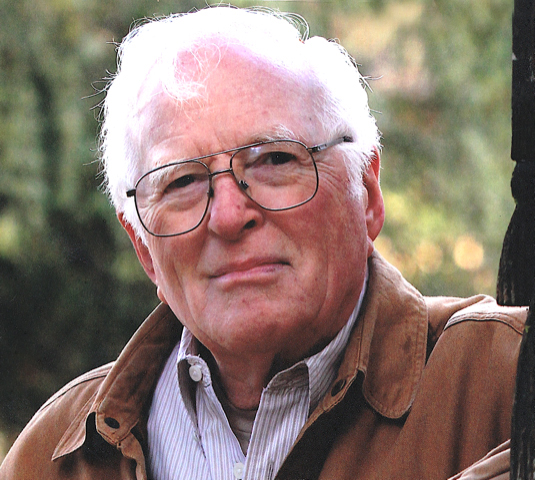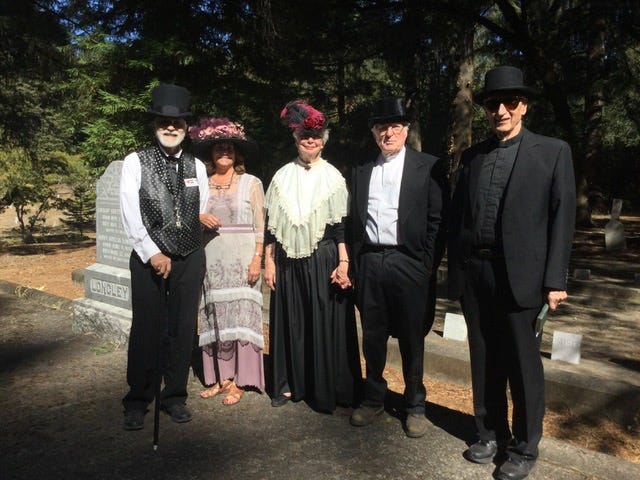John C. Schubert
Marine/Deputy/Historian/Author/Father/Grandfather/Friend
August 9,1938 – June 6, 2022

John C. Schubert boarded the Guerneville Branch Railroad on June 6, 2022 for his final ride after a courageous battle with cancer.
John was born in 1938 in San Francisco. He grew up in various Northern and Southern California communities and spent his summers in Guernewood Park on the property that his grandfather acquired in 1914. In his early days he was a Merchant Mariner with the Pacific Far East Lines/ San Francisco as Assistant Purser. He received a B.A. degree in Anthropology in 1973 from Sonoma State University and served in the Marine Corps as a Sergeant from 1961-1967 and then again from 1978-1983. John had a long career as a Deputy Sheriff assigned to the Sonoma County Courts for 40 years. The down time between hearings afforded him the opportunity to research and write about Russian River history and the Northwestern Pacific Railroad (NWP) along the Russian River area. He had a regular column “Stumptown Stories” which was carried by “The Paper” published in Guerneville, and the “Sebastopol Times and News”. His twice monthly column ran for more than two years and earned him several literary awards. John was a resident of Guerneville and Sonoma County for 67 years. He was featured in episodes of Bay Area Backroads and Eye on the Bay. He has written and published five books on local history – “Guerneville Early Days”, “Tales of the Russian River”, “Russian River Then and Now”, “Hidden History of Sonoma County” “Red Slide Magnesite Mine and Railroad” andeditor of the Russian River Historical Society’s newsletter, “Yesterday & Yesteryear”. John also gave annual cemetery tours, dressed in top hat and tails engaging tour attendees with stories of the founders of Guerneville and other characters who are buried in the Pioneer Section of the Redwood Memorial Gardens cemetery in Guerneville. Beyond serving as the local river historian, John contributed as much or more to the rest of Sonoma County. John is past president of the Sonoma County Historical Society, and editor of their newsletter “Sonoma Historian”, Vice President of the Russian River Historical Society, president of the Friends of the Guerneville library, member of the Russian River Jaycees, a civic organization, and a member of the Board of Directors of the Northwestern Pacific Railroad Society. John is also credited with helping save the 1885 Marshall House now located at the Russian River Senior Center on Armstrong Woods Road and was a key advocate for saving the historic Guerneville Bridge, built in 1922. It was these accomplishments for which John received the Spirit of Sonoma Award in May of 2021, honored by the State of California for his many contributions to the county and community of Guerneville and was awarded the Jeanne Thurlow Miller award for his lifetime of historic work by the Sonoma County Historical Society in March of 2022. He will be remembered for his superb sense of humor, bountiful jokes, positive attitude and “Dancing Girls”. He is survived by his life partner of 38 years, Sarah Brooks, 3 sons, Keith, (Daria) Hilmar (Gina), Preston, (Janette) and 4 granddaughters Jasmine, Sabrina, Johnna, Heather and one grandson, Doren. In lieu of flowers the family requests donations to:- Friends of Guerneville School
- Monte Rio School
- Santa Rosa Junior College Foundation
- Russian River Historical Society
- Sonoma County Historical Society
- Northwestern Pacific Railroad Historical Society
- Sonoma County Library
- Russian River Rotary
- Sonoma Land Trust
- Stewards of the Coast and Redwoods
- Montgomery School
Link to the article Retired journalist, Chris Smith – FOR THE PRESS DEMOCRAT
County baliff, historian dies at 83
Colleagues remember Guerneville collector had a gift for storytelling
FOR THE PRESS DEMOCRAT
As a kid, John Schubert found that he loved the Guerneville area more than any other. He grew up to become a fountain of lower Russian River history, and to go to work each day with a local artifact pinned to his shirt.
The easygoing, studious and perpetually intrigued Schubert was for almost 40 years a Sonoma County Sheriff’s deputy assigned primarily to courtroom security. He was proud of the vintage and rare badge that proclaimed him: Bailiff.
“Schubert was the only person I ever saw with one,” Sheriff Mark Essick said.
Schubert, who in addition to his law enforcement career served in the Marine Corps Reserve, died June 6. He was 83.
“He ended up being the go-to guy for history of the Russian River area,” said friend and colleague Gaye LeBaron, the Sonoma County history writer and retired Press Democrat columnist.
LeBaron added, “John was also extremely personable, and just great fun. What a gift he’s been to the region.”
A resident of Guerneville for 67 years, Schubert authored five books of local history. For decades he also shared tales of Russian River history in columns published in The Paper and the Sebastopol Times & News.
The Sonoma State University alumnus was dealing with advancing cancer when, just last year, he donated to the SSU library his massive collection of lower Russian River memorabilia and artifacts.
“He started collecting even before he knew quite why,” LeBaron said.
Among them: stacks of old postcards, photographs, posters, flyers, matchbook covers, menus, news clippings, tickets, playbills, ledgers, invoices, receipts, brochures, journals, manuscripts, court documents, letters, albums, stock certificates, books, maps, postmarked envelopes, scrapbooks, family histories and
CONTINUED FROM A3
bumper stickers, you name it.
Sources of the collectibles included the annual Bohemian Club encampment in Monte Rio, Rio Nido big-band music venues, the railroads that hauled timber and tourists, the Slug Fest, the Quicksilver Mine, Stumptown Daze parades, Russian River Rodeo, Monte Rio Water Carnival, the Russian Chapel at Fort Ross and the various Russian River floods.
Schubert’s collection came to the college library in 88 boxes that when lined up ran for 53 feet. Lynn Prime, SSU’s special collections librarian, said the collection is a treasure trove that will appeal to students and others interested in myriad aspects of life in the region.
Schubert, Prime said, “never did anything in half measures.”
“He was such a Renaissance guy,” she said. “And it shows in his collection.”
The library’s John Schubert Russian River Collections is open to the public by appointment.
Historian and retired Sonoma County History and Genealogy Library staffer Katherine Rinehart counts herself fortunate to have witnessed Schubert as he conducted in-depth research, and to have helped him organize and process the collection in preparation for donation to SSU.
“There’s no better way to get to know a person,” she said, “than to go through everything he collected since 1959.”
Keeping history alive
Energetic and eager for opportunities to make history come alive, Schubert constructed in the backyard of his and longtime partner Sarah Brooks’ home in Guerneville a replica of the Northwestern Pacific Railroad, complete with a station and working signals.
“His fascination with history was something else,” said Doug Broberg of Guerneville, a friend and fellow history buff and retired deputy sheriff.
One of Broberg’s favorite pieces of John Schubert trivia: “He had a casket he kept in his house.”
Schubert used the coffin decades ago as a prop for an elaborate Halloween party and afterward simply kept it standing upright against the wall in his living room.
Beyond his lifetime of studying, collecting and sharing Russian River history, Schubert worked to save what he could of it. He played important roles in the conservation efforts that preserved the historic, downtown Guerneville bridge — built in 1922 — and the 1885 Marshall House that now graces the Russian River Senior Center.
Schubert would often don a top hat and tails, then entertain and enlighten visitors to the pioneer section of Guerneville’s Redwood Memorial Gardens cemetery. He was for decades a pillar of the Russian River Historical Society, which he co-founded, and other organizations of people who celebrate, share and preserve history.
For all that did for his community, Schubert was awarded a Spirit of Sonoma Award just last May. And in March the Sonoma County Historical Society presented him its Jeanne Thurlow Miller Award in recognition of his lifetime of historical work.
Helping the community
John C. Schubert was born Aug. 9, 1938 in San Francisco. From an early age, he spent summers on land at the Russian River’s Guernewood Park that a grandfather had owned since 1914.
Schubert was a teen living and attending high school in Southern California when he conducted his first piece of research into western Sonoma County history. He wrote a report on Fort Ross, the settlement the Russians established in the early 1800s on what would become the Sonoma Coast.
“Everybody in that class — with the exception of the teacher — though I was goofy, talking about Russians in California building a fort,” Schubert told The Press Democrat in 2018.
Following young Schubert’s graduation from Rosemead High School in 1956, he studied at the state Maritime Academy and worked for a time as a merchant mariner.
He would share that he was somewhat adrift when a well-known and revered deputy sheriff on the Russian River, Pete Bever, one day pulled up alongside him in his patrol car. Schubert recounted to columnist LeBaron in 2012 that Bever called out him, “You’re just bummin’ around, kid. Come and ride with me.”
Schubert liked what he saw, and not long later signed up as a summer deputy. He was hired fulltime in 1965.
One of his three sons, Keith Schubert of Redmond, Washington, said the new lawman figured out quickly that working patrol on the river was not for him. “He didn’t want to arrest his friends,” the younger Schubert said.
So John Schubert became a bailiff assigned to the Sonoma County courts, and he stayed.
The badge he received early on designated him a bailiff. Long ago, the sher-iff’s office stopped making any distinction between deputies who work in the courts and those who work the streets. But Schubert, ever an aficionado of old ways, kept wearing his keepsake badge.
In the early 1970s, while working the courts, he enrolled at Sonoma State University and earned a degree in anthropology. He also joined the Marine Corps Reserve, serving two stints and earning the rank of sergeant.
He worked as a bailiff until his retirement in 1998.
Until 2004, he was oncall and reported for duty when needed for tasks that included transporting suspects and standing guard over suspects undergoing hospital care.
The lawman and historian married and divorced twice, and he spent the last 38 years with life partner Brooks.
He is survived by her and by his son in Washington, his other sons, Hilmar Schubert and Preston Schubert, both of Santa Rosa, and by five grandchildren.
A memorial service is at 1 p.m. June 30 at Pleasant Hills Memorial Park in Sebastopol.
Before he died, Schubert asked that memorial contributions be considered to the Russian River Historical Society, russianriverhistory.org, or to his other favorite organizations: Friends of Guerneville School, Monte Rio School, Montgomery School, Santa Rosa Junior College Foundation, Sonoma County Historical Society, Northwestern Pacific Railroad Historical Society, Sonoma County Library, Russian River Rotary Club and Sonoma Land Trust.
Link to the article Printed Courtesy of Dale Dougherty – Sebastopol Times – June 14, 2022
John Schubert Among Old Graves
Bob Jones remembers a cemetery walk in Guerneville led by Russian River historian John C. Schubert, who passed away on June 6th.





